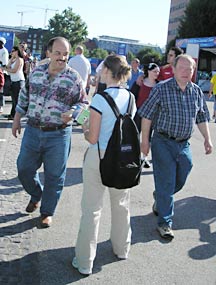Posted: 8/18/06
Divorce affects faith development
By Deborah Potter
Religion & Ethics NewsWeekly
CHARLOTTE, N.C. (RNS)—When Jen Thompson looks at family pictures, the memories still are painful. Her parents divorced when she was 14, and along with the sense of loss came a crisis of faith.
“My father was emotionally just barren—just not available,” she said. “So I came across as thinking that my father was just impossible to please. And that definitely carried over into my relationship with God—that I felt God was just very judgmental.
“God was just waiting for me to slip up and make a mistake, and that I was, in God’s eyes, unforgivable and unlovable.”
It’s a surprisingly common experience.
A recent national survey of adults who were young when their parents divorced found the separation had a major impact on their spiritual lives. They were, for example, much less likely to go to church or to call themselves religious than adults whose parents stayed married.
“One extraordinary finding in our study was that of those grown children of divorce who were active in a church at the time of their parents’ divorce, two-thirds say that no one in the clergy or congregation reached out to them at that time,” said Elizabeth Marquardt, the author of Between Two Worlds, a study of children and divorce.
Her study found adults often feel the church abandoned them as children when their parents were divorcing and that their pastors were no better than anyone else in helping them cope with the experience.
“At the time of divorce,” Marquardt said, “people are reluctant to reach out to the children because they don’t know what to say; they don’t want to offend the parents. They’re afraid they might upset the child, so they don’t reach out.”
Jeff Williams, a leader of the Association of Marriage and Family Ministries, was 10 when his parents divorced. No one seemed to notice the cataclysm taking place in his life, he said.
“We went to church, and the older ladies were complaining about the temperature of the sanctuary, and the ushers, the people who served, went on with their rituals, and nothing seemed to change there, while my life had radically changed.
“And I know now they didn’t know what to say. But it’s like you have had a leg blown off or you’ve had a wound and it’s terrible and nobody sees it.”
Linda Ranson Jacobs, executive director of Divorce Care for Kids, or DC4K, said her group’s program, which has been adopted by 2,000 congregations, argues that divorce affects every area of a child’s life—emotional, spiritual and intellectual.
“We wanted to put together a program to teach churches what the children are experiencing, the grief that they’re going through, the stress that they’re under, and bring them into the church family,” Jacobs said.
“You know, what better place for a child who’s lost their earthly family to be than in a church family,” she said.
Training videos by DC4K feature children wrestling with common divorce-related problems, such as being torn between the parents’ two homes and their two churches.
“I think the biggest accomplishment is just keeping God in front of those children, changing how they look at a father image or a parent image,” Jacobs said.
Twenty years after her parents’ marriage dissolved, Thompson—now recently divorced herself—said she still is working on her image of God. “I have had to ask God to make himself real to me and (I) say: ‘I need you to clear this up for me. I’m having trouble seeing you as a loving Father.’
“And sometimes I call him Daddy. Sometimes, when I’m praying … about things that are going on in my own life, sometimes instead of saying ‘God,’ or ‘Lord,’ I just say “Daddy, I’m having a hard time,’” she said. “I’m trying to personify him as that loving Father.”
News of religion, faith, missions, Bible study and Christian ministry among Texas Baptist churches, in the BGCT, the Southern Baptist Convention ( SBC ) and around the world.





